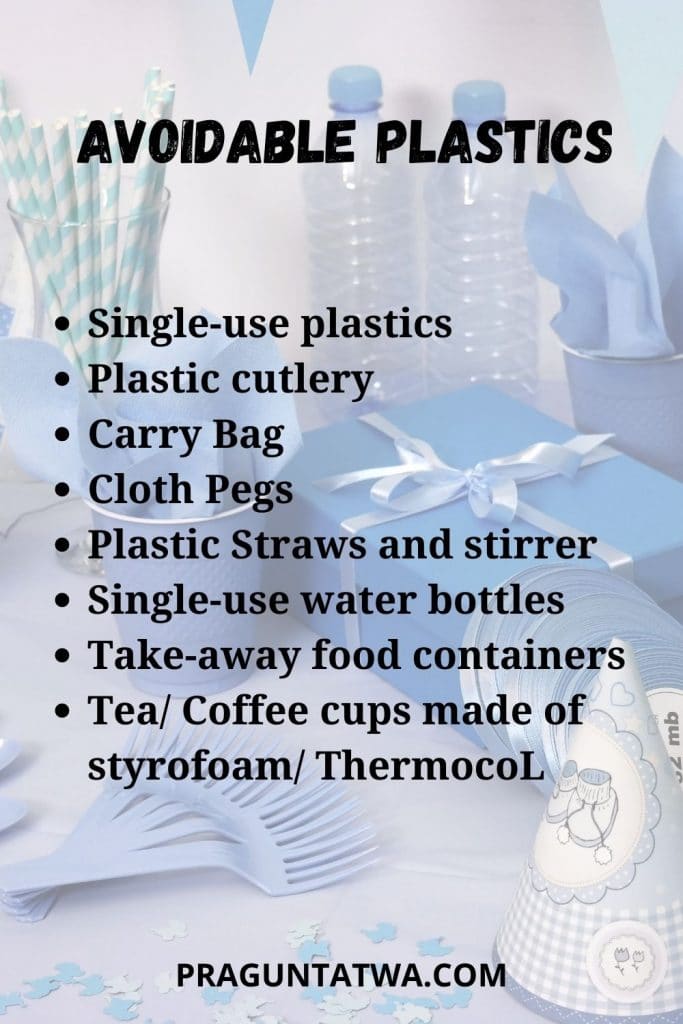AVOIDABLE SINGLE-USE PLASTICS

Plastic has become a continual part of our lives. It’s everywhere around us: packaged products, cosmetic ingredients, textiles, mobile phones, etc. Even in the clothes, you wear, the cup your drink coffee from, and even chewing gum you might be chewing on right now! Plastic is ubiquitous and it gets difficult for us to even imagine giving it up or living without it. Reducing the consumption of plastics, therefore, requires not only a change in habits but also a change of mindset. Out of all the plastic we use, much of it can still be avoided. Scan your house and see all the avoidable plastics and try to get rid of them.
Environmental problems due to plastic
Plastic waste often does not decompose and can last centuries in landfills, or else end up as litter in the natural environment, which in turn can pollute soils, rivers, and oceans, and harm the creatures that inhabit them. Just because of ease of use and benefit of food safety and reduced packaging weight in transit, we opt for single-use plastic.
Some avoidable plastics
The fact that plastics are now a serious headache for the planet is proved by the fact that more and more governments are proposing measures to reduce their impact on the environment. Sharing below are some of the avoidable plastics that we can try to get rid of from our lives.
- Single-use plastics and cutlery
Single-use plastics, or disposable plastics, are those that can only be used once before they are thrown away or recycled. single-use plastic is available in many things like plastic bags, straws, coffee stirrers, soda, and water bottles, and most food packaging
Plates and cutlery made from disposable material, make our lives easier but seriously harm the planet. Disposable containers are inundating supermarkets (polystyrene trays, PET bottles, tetra paks, plastic containers, etc.).
- Plastic Straws and stirrer
Please avoid using plastic straws and stirrers in the first place.
While accepting a drink, refuse the straw and its use. If it’s so necessary, carry your own straw.
Straws made of steel, bamboo, glass, and even cardboard are widely available these days.
- Coffee cups made of styrofoam or thermocol
Please don’t use disposable coffee/ teacups. Instead, keep a reusable cup in the car or your purse for use when you move out. Choose to buy tea/ coffee from shops that have compostable cups or reusable ones. Please share this and encourage your family, and friends to avoid the use of plastic-lined coffee cups.

- Take-away food containers
Try and avoid takeaway containers. Instead, if possible carry your own tiffins, or boxes or casseroles to pack food.
Also If you carry your food to work, opt for glass or stainless steel containers instead of plastic packaging or tiffins.
- Single-use water bottles
Carry a reusable water bottle. Fill up reusable water bottles from home, so you don’t have to buy a new bottle every time.
- Carry Bag
Ditching the use of polybags is the simplest solution we can adapt. Make it a compulsory habit to use reusable bags made of cloth or jute etc to carry the groceries or veggies and fruits which we bring at least once a week. Carrying one cloth bag can help to improve the health of our planet.
- Cloth Pegs
Even the smallest of actions can have a major positive impact on our planet. For example, something as routine as hanging out clothes can become an extraordinary act if we change from plastic to wooden pegs. These days even metallic/ steel pegs are also widely available and they are long-lasting too.
- Choose to reuse and give some of the packaging a new purpose
If you have no choice but to buy a plastic bottle or a plastic container at the supermarket, reuse it instead of throwing it away. A bottle can be filled up as many times as you like and containers can be used to store other food. Avoid using cosmetics that use micro-plastics, buy a biodegradable brush and wear natural fabrics. Take your own personal care products when traveling.
Watch your waste
Make it a habit and even teach your children and neighborhood to take care of their waste. Watch what are you throwing out and be careful and pay attention to which container are you throwing the waste into.
- Be aware of the products we use, and the time frame we use them for. Are we using it for short time and throwing it away or still it can be reused.
- Think about the reuse value of thing you are using, or any alternative available to recyle it.
- Opt for alternatives that are reusable and/or can be collected for recycling.

To sum up, This is my conscious lifestyle post to spread more awareness on sustainable living. It’s Sustainable September, join me for more such ways and tips and become part of my Conscious and sustainable living ideas. Visit my blog and make yourself conscious and aware of being more concerned for our environment, and alter your lifestyle.
Being Eco-Friendly is not a choice, make it a habit.








I love how you emphasize doing something you are passionate about.
designflagstore – https://www.designflagstore.com